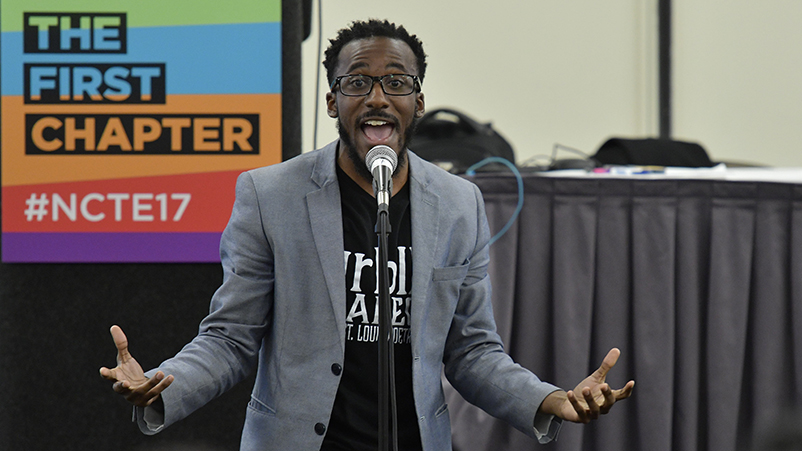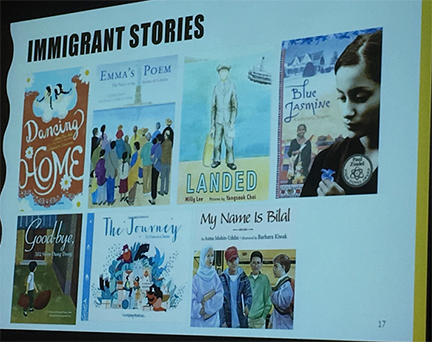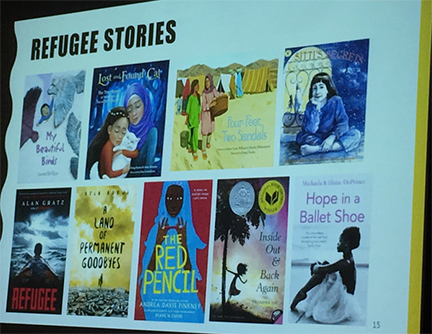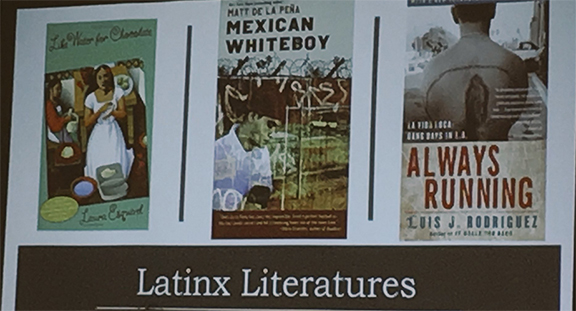This post by NCTE member Carla España is reprinted with permission from her blog.
Why should you attend the NCTE Convention this year? We’re sharing a series of reflections from teachers who attended the 2017 NCTE Annual Convention to help you answer this very question!
It’s been two weeks since I returned from the National Council of Teachers of English (NCTE) Annual Convention in St. Louis, Missouri. Before I partner with teachers, administrators, and higher education colleagues on 2018 proposals, I have to first share why this gathering is a transformative one.
I especially hope more educators of color (from K-12 and college, university settings) get support from their institutions to attend, present, and take these learning experiences back to our schools.
I also hope more of us continue to collaborate across the school year in different ways and on different platforms (through book clubs, in-school professional learning communities, and social media platforms—see my previous blog post for examples).
Finally, this NCTE 2017 was even more special for me (I attended and presented for the first time in 2015) with the Latinx Caucus mentoring session, Creating Dialogue Across Generations of Scholars: Revolutionary Scholarship For and With Latinx Students, Families, and Communities, organized by Dr. Tracey Flores (@traceyhabla) from the University of Texas, Austin.
Not only did I get to spend time with my mentor, Dr. Sybil Durand from Arizona State University, but I also got to hear from other amazing educators of color who shared their community and university partnerships. Steven Arenas (@sarenas89) presented on Latinx texts by Matt de la Peña and Luis Rodriguez and how he used them in the classroom. Dr. Laura Gonzalez (@gonzlaur) at University of Texas, El Paso, presented on the community-university partnerships and I was super inspired!
Of course, inspiration comes from many people and spaces. . . . Thank you to all who organized these events, presented their work, signed books, and shared their time with us!
1. Discussion on Transformative Texts with Authors and Educators
I attended several sessions with authors that have changed my life, changed my students’ lives, and change my pre-service/in-service teachers’ lives as we read their texts in book clubs and planned lessons. These [quotes and book titles] are coming from the following sessions I attended:
Recapturing our Shared Voices: Humor and Play as a Healing Force in Literature for Children
Nikki Grimes (@nikkigrimes9) said “humor unites readers that come to the page” and we certainly felt that in the room as these authors read from their books, shared some of their own favorite authors, and encouraged us to use humor and play in our classrooms.
Yuyi Morales (@yuyimorales), Dan Santat (@dsantat), Nikki Grimes (@nikkigrimes9), Mac Barnett, and Jon Klassen (@burstofbeaden) shared [many text recommendations — see image in original blog) .
Rediscovering and Sustaining Relevance with the Literature We Teach: Presenting Authors Whose Books Share Diverse Voices and Perspectives with Students, to Engage Them and Ignite Their Love of Reading, Inquiry, and Learning
Renée Watson (@reneewauthor) shared the following in her presentation “How do you feel whole in a world that tries to break you? Poetry can be a way to help young people speak to that.”




For those of you looking for text sets on immigrant and/or refugee stories, see author N.H. Senzai’s recommended texts below:
From “Mini-Libros” to Puppet Shows: The (Re)Evolution of Latinx Literature for Youth and Its Role in the ELA classroom
Steven Arenas (@sarenas89) shared how using the following texts impacted his classroom community.
Benjamin Alire Sáenz (@BenjaminAlireSa) has moved me with his characters, his love for humanity, and at this session, with his words about his books and writing. I cried the most this weekend listening to him describe the reasons why he writes and I am so thankful for his books. I’m thrilled that we get to read part two of Ari & Dante in the not so distant future and that there will be a film, news he shared with us at this session.
- “you see that they are beautiful because you are beautiful” Benjamin Alire Sáenz responds to students’ letters on Ari & Dante
- I love not only my writing but my community. I love the border community. I love Juárez. I will not be told to love only people that live within border”
- “Ari learns to see not just Dante and not just himself but learns to see his parents. There is so much love in the world and we’ve forgotten how to see it, how to take it.”
2. Discussion on Teaching and Coaching Methods with Partnerships across Schools, Communities, and Universities
In Culturally Sustaining Early Literacy Teaching: New Approaches, Strategies, and Practices, teachers and university staff shared these methods, reflected in this amazing text!
In The Reciprocal Teacher/Coach Relationship: Finding Our Collective Voice to Move Instruction and Learning Forward, I was so proud of our Hunter College Read East Harlem team of teachers and coaches that presented on the coaching relationship, how they communicated, planned, co-taught, and learned from one another.

3. Listening to Students Discuss Texts and How These Have Impacted Their Lives
Thank you NCTE Middle Level Section Steering Committee for organizing this session: Why Middle Matters: Student-Led Roundtables—Expanding Horizons/Increasing Awareness with Diverse Books! This was definitely a highlight of my weekend as I got to hear from students!
At the Piecing Me Together roundtable (by Renée Watson @reneewauthor), I heard:
- “The book is teaching me a way through life”
- “There are different kids with different stories and teacher have to let kids read it first and understand it.”
- “I wanted to be the best self that I can be”
- Do you feel that students need to leave home?
- How did you use the book?
- What steps does Jade need to be successful?
- What connections did we have with the book?
- Student 1: I got inspired in writing poems
- Student 2: I related to her on a different level, education. Feeling like you have to catch up to kids.
- Student 3: How she dealt with bullying.
- Student 4: Girl with my type of hair.
At the Brown Girl Dreaming (by Jacqueline Woodson @JackieWoodson) roundtable, I heard:
- Book as helping ALL students.
- Why Diverse books? Diversity matters in books!
- “By reading these books you get to know people”
- “It’s good that we have a diverse school.”
- Book shows relationship with family
- Favorite Parts
- Student 1: Looking things up they didn’t know. Noticing history repeating itself.
- Student 2: “I’ve never read a book that was written in poem form”
- Student 3: “I could step out of my comfort zone”
At the roundtbles forYaqui Delgado Wants to Kick Your Ass (by Meg Medina @Meg_Medina) and Flight (by Sherman Alexie @Sherman_Alexie), I saw students have a really clear structure for discussing the texts. One student said, “most people steer clear of these topics in the book” and another, “when you read diverse books I feel like you know the truth!”

4. “Contigo en la Lucha” and “What Gives You Fuerza?”
I heard this at the Creating Dialogue Across Generations of Scholars: Revolutionary Scholarship For and With Latinx Students, Families, and Communities session and I felt it throughout the conference. “With you in the struggle” or “contigo en la lucha” as Gloria Anzaldúa would say.
We were encouraged to ask “what gives us strength?” and I ask myself this often in the work that I do. I felt the solidarity in community with the Latinx Caucus. I felt it through the words shared in sessions by the authors I’ve mentioned above and Jason Reynolds (@JasonReynolds83), Matt de la Peña (@mattdelapena), Angie Thomas (@angiecthomas), Jaqueline Woodson (@JackieWoodson), Jimmy Santiago Baca (@JimmySBaca), Meg Medina (@Meg_Medina), Laurie Halse Anderson (@halseanderson), Benjamin Alire Sáenz (@BenjaminAlireSa), Nikki Grimes (@nikkigrimes9), Carole Boston Weatherford and Yuyi Morales (@yuyimorales).
I truly hope K-12 schools and institutions of higher education can support their teachers so that there is equity in access to these experiences from support with attendance, presentations, and later turn-key/sharing at their schools, classrooms, and departments.
Carla España is a bilingual teacher educator, researcher, writer, literacy consultant, and speaker. She teaches inservice and preservice teachers in the Bilingual Program at Hunter College, School of Education.




